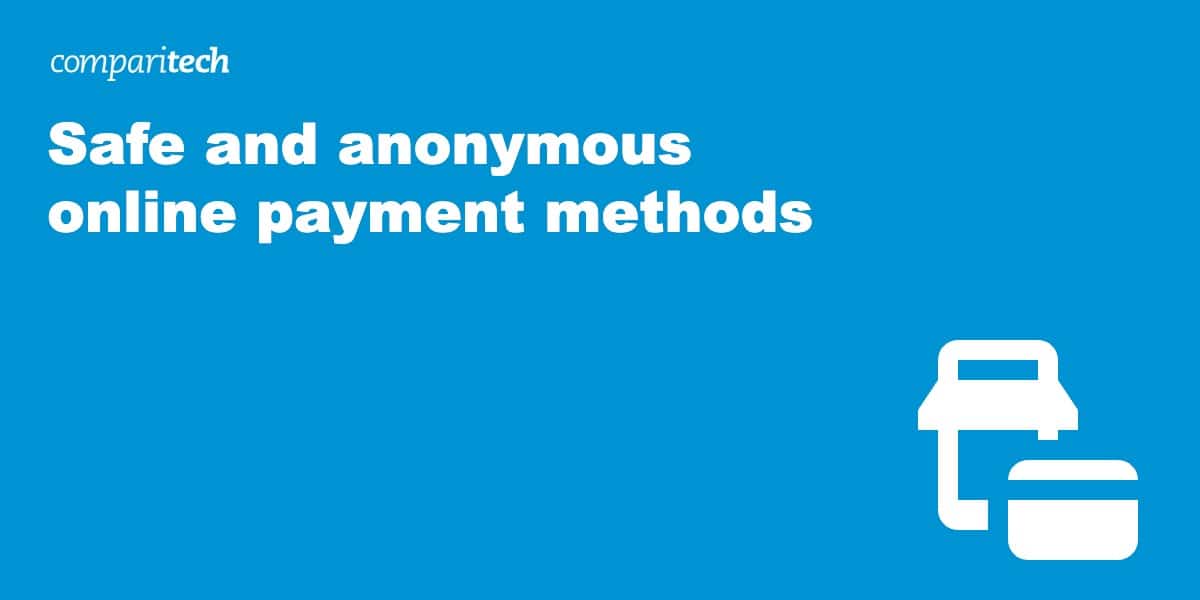When so much of what we do is online, safeguarding our security and privacy is all the more important. Buying online typically means having to share your data, including your name, address, and credit card number. While we can vet the websites we buy on, this only reduces the level of risk, rather than removes it entirely. Data breaches and identity theft are just some of the threats associated with sharing personal information for online payments. This is where safe and anonymous online payment methods come in.
If you’re worried about giving out your personal information, you can use an alternative that ensures your identity isn’t compromised. In this post, we’ll cover safe and anonymous online payment methods (as well as some semi-anonymous options), and their respective pros and cons. That way, you can find one that best suits your privacy requirements while shopping online.
Safe and anonymous online payment methods
Cryptocurrencies
In case you’re unfamiliar with cryptocurrencies, they’re essentially virtual currencies. Their security comes from cryptography. Notably, they’re decentralized in that transactions are verified and records maintained by a decentralized system (as opposed to a central authority such as a bank or the government).
Chances are that if you’ve heard of one cryptocurrency, it’s Bitcoin. While Bitcoin is often described as an anonymous payment method, this isn’t entirely accurate. Bitcoin transactions can be traced. Although your identity is not directly addressed to your Bitcoin address (a unique identifier for sending cryptocurrency), all transactions are publicly stored on the blockchain.
The good news is that there are many more cryptocurrencies to choose from. Monero is widely considered to be anonymous. Transactions are private by default thanks to features including stealth addresses (one-time addresses) and ring signatures for obfuscation.
An increasing number of websites and services accept cryptocurrency as payment, it’s still Bitcoin that is by far the most widely accepted.
Cryptocurrencies are highly volatile due to how much their price can fluctuate day-today. Furthermore, most methods of buying Bitcoin and other cryptocurrencies (such as doing so via cryptocurrency exchanges) requires signing up and providing your personal information.
Paysafecard
Paysafecard is a prepaid payment method that allows you to make an online payment without a credit card or even a bank account. You can purchase a Paysafecard at a physical location such as a supermarket or gas station. The card comes with a 16-digit PIN which you enter when making a payment online.
The advantage of Paysafecard is that you don’t need to provide any bank account information or credit card data when making an online purchase. Indeed, with some transactions, you won’t even need to sign up for an account. If you buy the Paysafecard in cash, you can obtain a PIN without it being tied to your identity.
However, some websites and services may still require you to provide additional personal details during the checkout process. Furthermore, there are spending limits when it comes to the Paysafecard you can purchase and use without a credit card or bank account. This limit varies by country, but it’s possible to combine multiple cards (and PINs).
Gift cards
A gift card is a type of prepaid card that can serve as an anonymous online payment method if used appropriately. Many gift cards can be purchased with cash at physical locations. Furthermore, they don’t require you to provide any personal information. Some gift cards can also be used online, allowing you to make an online purchase without revealing your credit card or bank account details.
It’s important to keep in mind that if you use a gift card with an account that has your personal information, the gift card can be linked back to you. The same can be said if you purchase a gift card online. Of course, it’s also fair to say that gift cards have their limitations and can often only be used in specific stores.
Prepaid cards
Prepaid cards can be a relatively anonymous payment method, particularly when compared to traditional credit cards or debit cards that are linked to a bank account. Prepaid cards can be physical or virtual cards that you load with money. It’s recommended that for anonymity, you purchase a prepaid card with cash at a physical location such as a grocery store or post office. You’ll still be able to use it to make purchases online.
Aside from paying for a prepaid card in cash, there are a couple of other things you should do in order to ensure anonymity. First, register the card with a throwaway email account. That way, you don’t have to reveal your name, phone number, or primary email address. You’ll also want to avoid reloading the prepaid card from a bank account that will link the card to your identity.
Disposable credit cards
Also referred to as virtual or temporary credit cards, disposable credit cards function like regular credit cards that can only be used once. Each virtual card has a unique number, expiration, and security code that become invalid after one use or after a specific period of time. You can typically get a disposable credit card from your bank or credit card company. Some online payment services such as Apple Pay also offer virtual card features.
With a disposable credit card, you need only provide temporary details, so your main credit card information is kept private (and thus reducing the risk of it becoming compromised). However, disposable credit cards aren’t entirely anonymous in that the service that provides you with the card still has a record of the transactions you make.
Semi-anonymous payment methods
Cash App
Cash App is another popular P2P payment system that allows users to send and receive money without having to share personal details, credit card numbers, or bank account numbers with other parties. However, you still have to provide Cash App with those details. This, combined with the visibility of transactions on the platform means it’s not really suitable for truly anonymous online payments.
Google Pay
It should be stressed that while Google Pay is not an anonymous payment method, it does provide a level of privacy that paying via your credit doesn’t. It uses tokenization which means that when you use it for payments, it doesn’t send your credit card number. Instead, it sends a virtual account number (token) that represents your account information. This offers some protection from potential threats. Further, Google Pay security features include transaction encryption and two-factor authentication (2FA).
Despite the benefits as listed above, Google has access to your transaction data. When combined with what Google already knows about you, this can diminish your level of online anonymity. Google Pay requires a Google account and for you to link a credit card or debit card with that account. As such, it really comes down to how much you trust Google and whether it knowing more about you is worth the trade-off.
PayPal
One of the advantages of PayPal is that it’s one of the most widely used online payment platforms. Like Google Pay, it offers a layer of privacy but isn’t truly anonymous. To create a PayPal account, you need to provide personal information including your name, address, and email. Making transactions requires linking a bank account or credit/debit card too.
Despite the above, when you make a purchase with an online merchant, your credit card or bank account details aren’t shared. Instead, PayPal acts as an intermediary. You can even customize the name that appears on the recipient’s statements. This could be the name of your business instead of your full name, for example.
Venmo
Owned by PayPal, Venmo is a mobile payment service for peer-to-peer (P2P) transactions. Users are able to adjust their privacy settings so that transactions are only visible to the sender and recipient or only to themselves. However, to use Venmo you still have to provide personal information and link a bank account or credit card. The social nature of the Venmo app means it’s not really designed for anonymous transactions.
Safe and anonymous online payment methods: FAQs
Can a VPN help me make anonymous online payments?
Yes, a VPN can help you make anonymous online payments when coupled with an anonymous online payment method. A VPN encrypts your data and hides your IP address. It makes it much more difficult for hackers and snoopers to track what you’re doing online, including the online payments you’re making. This is particularly useful when you’re using public wifi, which typically lacks security and is vulnerable to a variety of threats.
Furthermore, you can spoof your location with a VPN. As such, you can bypass geographical restrictions and make anonymous online payments on websites from all over the world. However, you still need to make sure you choose the right VPN to enjoy the above benefits. Some VPNs, particularly free VPNs, don’t provide sufficient security or unblocking ability, which is why you might want to take a look at our list of the best VPNs available.
WANT TO TRY THE TOP VPN RISK FREE?
NordVPN is offering a fully-featured risk-free 30-day trial if you sign up at this page. You can use the VPN rated #1 for making secure online payments for a month.
There are no hidden terms—just contact support within 30 days if you decide NordVPN isn't right for you and you'll get a full refund. Start your NordVPN trial here.
Why should I use an anonymous online payment method?
There are many reasons to use an anonymous online payment method. The vast majority are security and privacy-related. In particular, using an anonymous online payment method prevents your personal and financial information from being exposed (such as in the case of a data breach). Protecting your data can also prevent its aggregation and use for marketing purposes.
There may also be times when you have to make discreet purchases that require a layer of privacy. This may be something health-related, for example. An anonymous online payment method can help because the payment doesn’t necessarily have to be tied to your identity.








